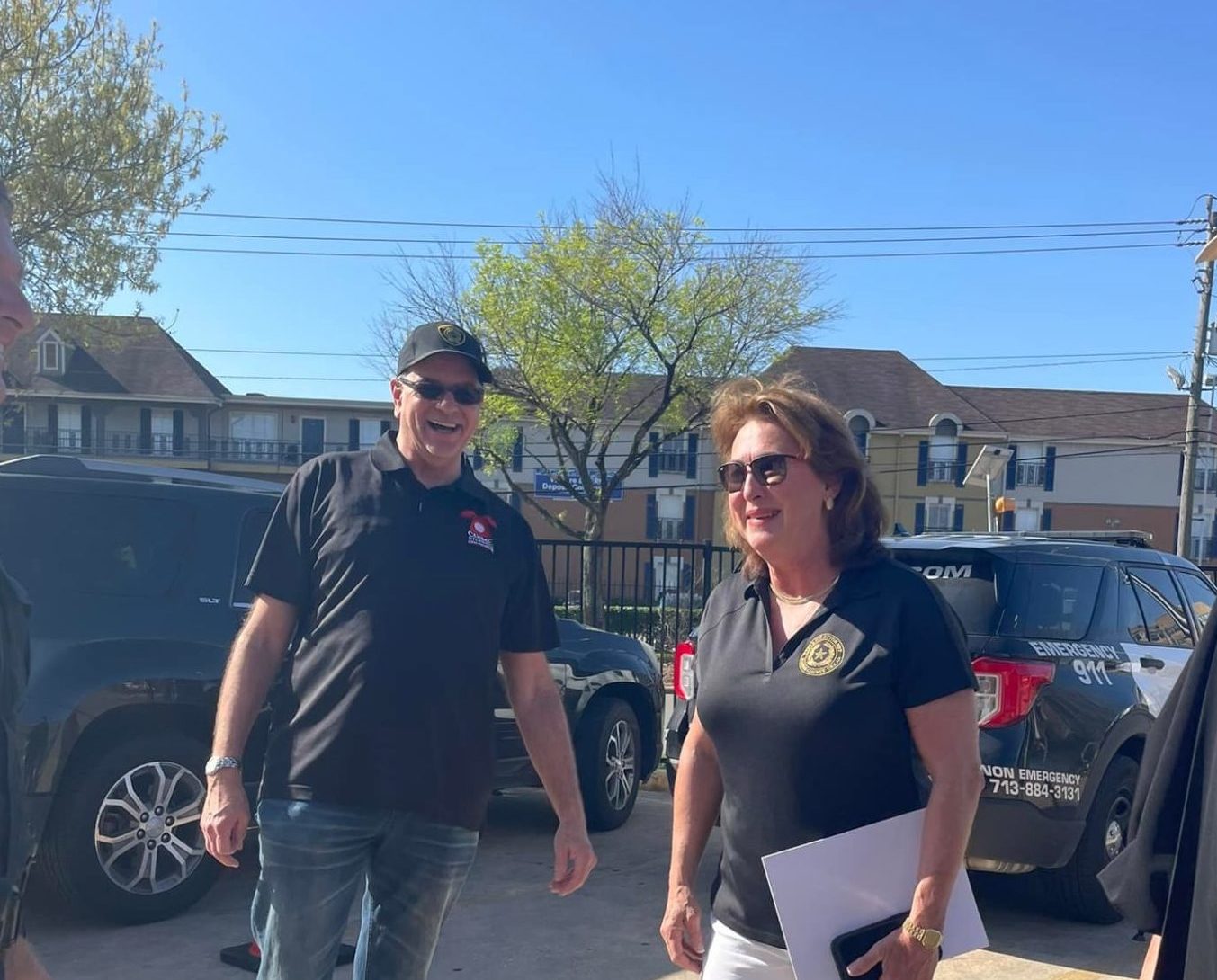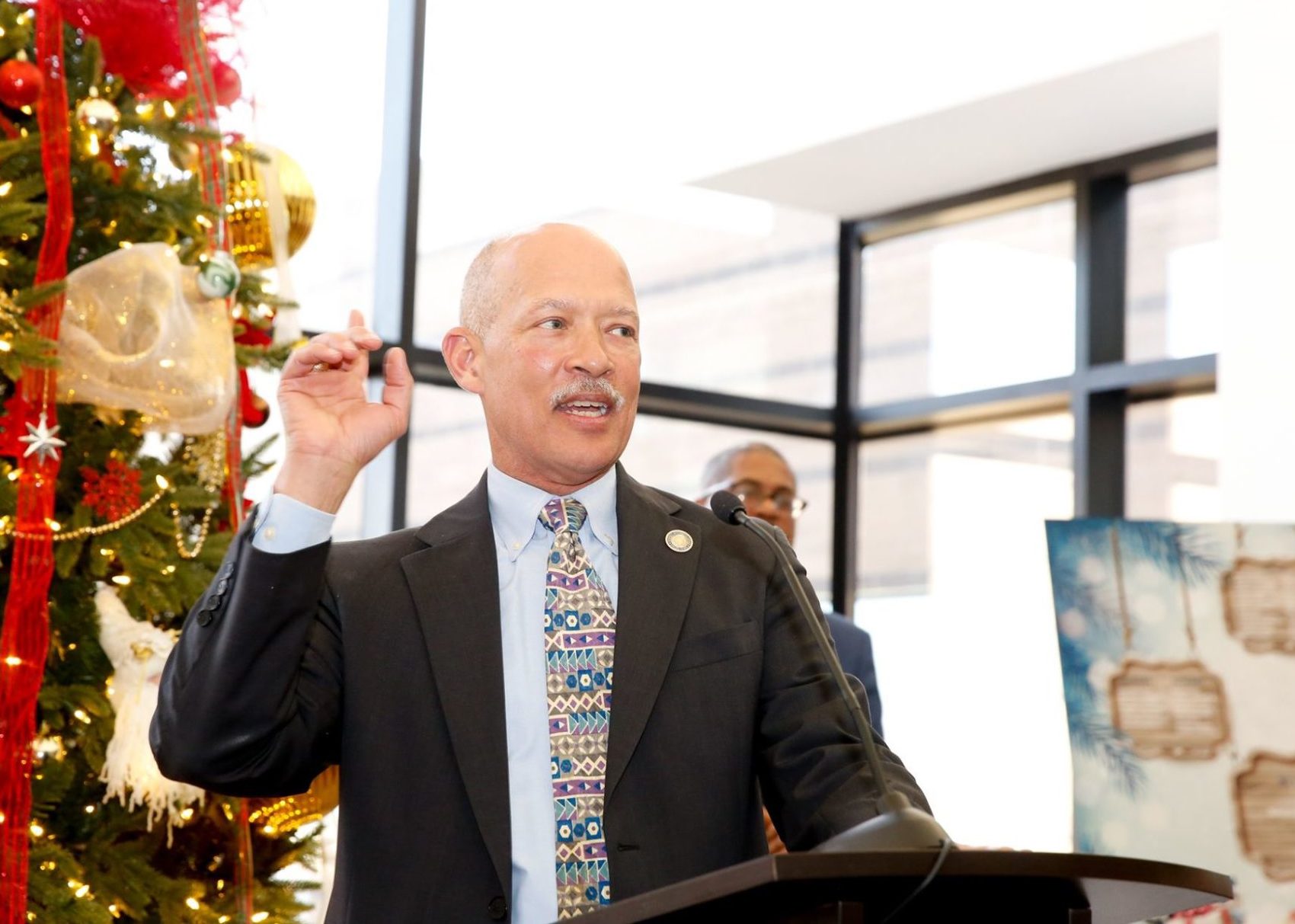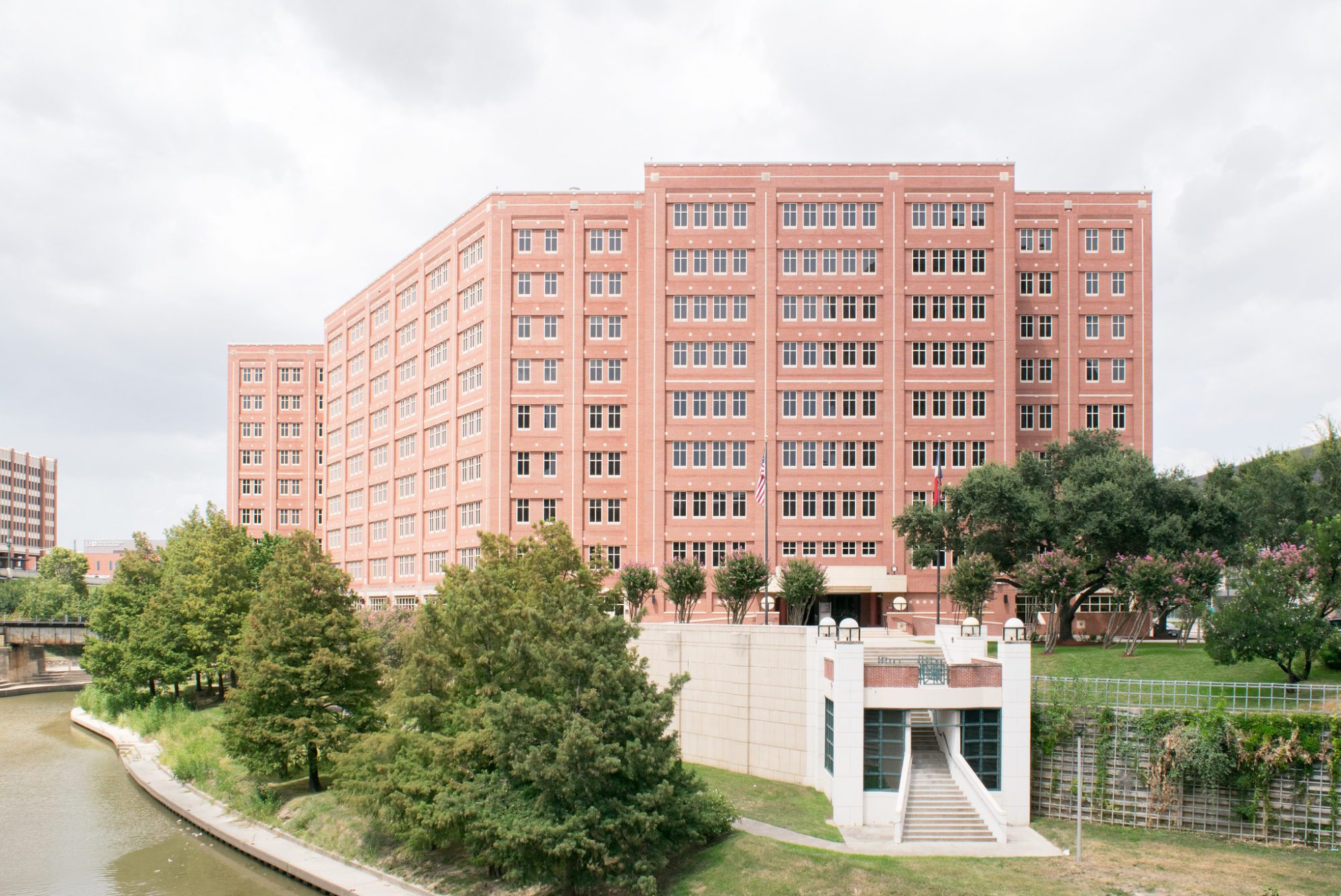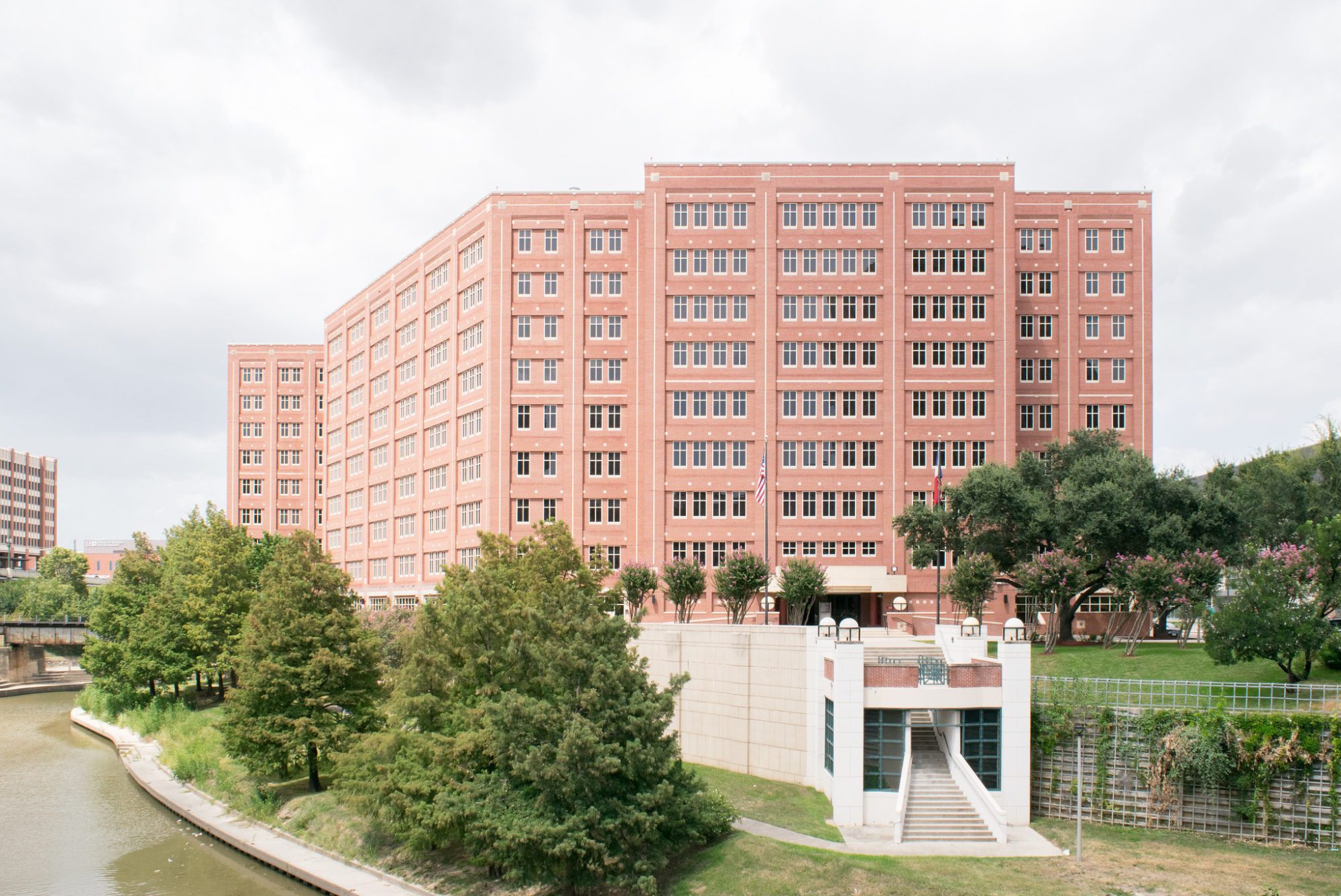A Texas ‘Crime Stopper’ Targeting Reform Judges Could Gain More Power Over Them
Governor Greg Abbott nominated Andy Kahan, a victim’s advocate and longtime champion for more incarceration, to the state’s commission on judicial conduct.
Michael Barajas | January 27, 2023


Andy Kahan is a familiar face in media coverage of crime and punishment in Texas, especially in Houston, where he was the police department’s longtime victim’s advocate. For decades, he rallied support for tough-on-crime legislation and held press conferences with crime victims to oppose parole releases or voice approval for executions.
In 2018, Kahan joined Crime Stoppers of Houston, a nonprofit organization that since 1980 has sponsored an anonymous tip line that paid out rewards of up to $5,000 for information that helped solve cases. Soon after Kahan joined, Crime Stoppers took a more aggressive stance and began targeting a new crop of Democratic, reform-minded judges, eventually blaming them for a 2020 spike in murders that was seen across the country. Kahan even started co-hosting a regular segment with the local Fox affiliate called “Breaking Bond” to shame and blame individual judges for crimes committed by defendants out on bail.
Kahan may soon gain more power to go after Texas judges. Governor Greg Abbott nominated him last month as a “citizen member” to the state’s commission on judicial conduct, an oversight body that hears complaints about local judges and whose recommendations can lead to sanctions or even suspension.
Kahan acknowledged that his nomination might be controversial in a social media post celebrating the news last month, writing, “I get that ‘some naysayers’ are none too happy about this but I’ve always adhered to the philosophy that when you advocate on behalf of one faction, you generally infuriate the other faction.”
Some Houston lawyers questioned whether Kahan could fairly field complaints against judges given his track record of going after them.
“If you’re in my shoes and you’ve watched this guy sit here and unfairly scapegoat judges for following the law for the past few years, and all of a sudden you’re moving him to a position where he could literally have the ability to influence whether or not good and fair judges keep being judges, that becomes terrifying,” said Murray Newman, the incoming president of the Harris County Criminal Lawyers Association.
Asked by Bolts whether he would bow out of cases that involve judges that he has campaigned against or criticized, Kahan said the commission has a recusal process that he will abide by “if a conflict of interest is determined on a case by case scenario.”
Kahan’s nomination, which is subject to confirmation by the GOP-run state Senate, highlights an increasingly harsh approach to the criminal legal system under Abbott. The governor and other state Republicans have dialed up crackdowns on local officials who have proposed reforms like detaining fewer people in jail pretrial or reducing the scale of prosecutions. In 2021, the governor successfully pushed the Texas legislature to pass a law setting limits on judges’ ability to reduce bail. This year, after years of attacking local Democratic prosecutors’ decisions to downplay charges for certain low-level offenses, Republicans have introduced legislation to circumvent or preempt the authority of local DAs.
Abbott is also likely to push for new bail legislation as state lawmakers convene this month; Kahan, who supported Abbott’s bail bill last session, has joined police and prosecutors in urging lawmakers to initiate a process to amend the state’s constitution to allow judges to deny bail in more cases, which Abbott prioritized last legislative session.
Krishnaveni Gundu, co-founder and executive director of the Texas Jail Project, which monitors conditions in local jails and advocates for better conditions, said Kahan’s nomination captures Abbott’s punitive approach to pretrial policy. “It’s clear that the governor has no interest in meaningful bail reform,” Gundu told Bolts. “Meanwhile people with mental illness and disabilities are dying in overcrowded jails while being detained pretrial.”
Kahan has become a celebrity of sorts among Texas Republicans and other tough-on-crime politicians for helping fuel the backlash to landmark bail reforms that Harris County judges implemented in recent years to reduce the number of poor people stuck in jail on low-level charges. A Democratic sweep in the 2018 midterms shook up the Harris County judiciary and added some judges who sided with civil rights organizations that were suing the county over its bail system. Those new judges agreed to settle the lawsuit and implement changes to reduce the number of people in jail over a misdemeanor charge, as well as pushing for other reforms like no longer jailing defendants for being late to court or testing positive for marijuana.
While Kahan has in the past voiced support for those changes, on TV he often insinuates that those reforms have led to more crime—despite years of reports and studies showing Harris County’s misdemeanor bail reforms have improved public safety.
“If we sit back in silence, we’re just as guilty as those who are actually promoting this type of criminal justice reform or collateral damage that we’re seeing from this,” Kahan said in a video that Crime Stoppers posted to Facebook last year responding to criticism that the organization had become too active in judicial elections.
While barred from participating in political campaigns, the nonprofit Kahan works for depends on financial support from politicians like Abbott. An investigation last year by the Marshall Project and the New York Times showed that Crime Stoppers of Houston, the largest nonprofit of its kind in the country, has received millions of dollars in grants from Abbott’s office, which helped it weather financial stress in recent years. The investigation also revealed that the changes implemented by many of the Democratic judges that Crime Stoppers and Kahan have publicly criticized have hurt the organization’s bottom line; some local judges are no longer making defendants pay a $50 fee that had once contributed to a large part of its budget. (It’s common around the country for courts to require defendants to pay fees to private organizations.)
Harris County District Attorney Kim Ogg, a conservative Democrat who ran Crime Stoppers of Houston about a decade before Kahan joined and gave the group $500,000 in 2021, has not faced criticism by the organization or Kahan, even though some local lawyers blame her office for not making more formal requests to increase bonds. Ogg, like Crime Stoppers, has targeted judges who supported reforms in Harris County, and her office has filed complaints to the state judicial commission to which Kahan was just appointed.
Throughout 2020, Ogg’s top lieutenant, first assistant DA David Mitcham, filed several reports with the commission against Franklin Bynum, a former public defender and reform-minded judge elected to the bench in 2018 who has frequently clashed with Ogg. Mitcham complained that Bynum had released too many defendants, reduced too many sentences, and displayed “an unprofessional and irredeemable bias against the State of Texas and its prosecutors.” Elements of the complaints were personal and inflammatory: “His erratic behavior and demeanor have deteriorated to such an extent that he may be suffering from some sort of mental impairment of undetermined cause,” Mitcham wrote to the commission on Sept. 25, 2020.
Ogg’s office attached to its complaint a photo of Bynum wearing a “Defund Chicago Police” T-shirt, which the Houston police union shared on social media. The judicial commission held a hearing about the complaints last April, a month after Bynum had already lost his primary election to a prosecutor in Ogg’s office. At the time, six of the commission’s 13 members were judges appointed by the all-Republican Texas Supreme Court, five were non-attorney “citizen members” appointed by Abbott, the Republican governor, and two were lawyers appointed by the state bar.
Members of the judicial commission lingered on the photo of Bynum in the “defund” shirt. “Violence in general has increased in the cities because the police have been maligned and degraded and disparaged, and violence against them has increased,” Janis Holt, an Abbott appointee and vice chair of the commission, told Bynum before saying her son is a cop. “When I see someone who wears ‘defund the police,’ it tells me that you don’t care about my son and his family and my granddaughter.”
The judicial commission recommended in July that Bynum be suspended, and even though he left office anyway at the end of 2022, that recommendation is still pending before the state supreme court. Bynum, who is fielding yet another complaint filed against him by another judge on his way out of office, says he’s concerned about Kahan’s involvement in any of his future hearings.
“I do remember once that he basically accused me of being responsible for murders in the county,” Bynum said, referring to Kahan’s statements while at Crime Stoppers. “I don’t think anybody who uses that kind of language with me should ever sit on a commission that’s deciding my fate professionally, and yet now I’m looking at a situation where I may not even have a way to challenge him doing that.”
Kahan told Bolts that he has not made public comments about Bynum. “Not sure where he is coming from,” Kahan said.
Houston lawyers say Kahan, Ogg and Abbott are reacting to a local judiciary that has started to finally incorporate more than just career prosecutors. “Before, Andy wasn’t an advocate who really had a nemesis, because he liked the DA, he liked all the judges, because they were all former prosecutors and he didn’t really have a lot to complain about,” Newman told Bolts. “It’s just a much more defendant- and constitutional rights-friendly atmosphere now than it was in the 1990s and early 2000s.”
Newman called Kahan’s selection for a watchdog role over judges an attempt “to turn back the clock.”
“Really, in a nutshell, we’ve got judges who are not soft on crime, they’re just fucking fair,” Newman said. “And the DA’s office is so used to having that extra prosecutor sitting on a bench in a robe that they think fairness is biased against them.”
Ogg and Kahan both testified at the legislature in favor of the restrictions on pretrial releases that passed last year, and which appear to have compounded deadly and dehumanizing conditions inside local jails. The director of a state commission tasked with oversight of county lockups in Texas warned in a meeting last November that the rise in county jail populations across the state, from 62,000 jail inmates in October 2021 to 70,000 last October, “should be raising red flags for everyone.” More people experiencing homelessness and mental health episodes are now getting stuck in jail on low-level charges like criminal trespass, one sheriff testified at the meeting.


Kahan has dismissed the notion that new restrictions are straining local jails that already struggled to meet the state’s baseline standards for treatment—including the Harris County lockup, which saw a record number of deaths last year. “Wow—what a disingenuous stretch to blame legislation meant to keep defendants charged with certain violent crimes from getting a get out of jail free card with the amount of deaths at the Harris County Jail,” he wrote on Facebook in reaction to local media coverage. The county’s top jail official resigned earlier this month as deaths, overcrowding and staffing problems continue to plague the lockup.
“Andy Kahan has been a voice consistently disrupting the idea that people are innocent until proven guilty,” said Jay Jenkins, an attorney with the Texas Center for Justice and Equity, which has advocated for bail reform in Harris County. Jenkins co-authored a 2021 report documenting media bias and misinformation around bail reform in Houston, which cited rhetoric by Kahan.
“The impact of publicly disseminating views that undermine confidence in the principle of innocent-til-proven-guilty is that you get a lot of people locked up for stuff that they didn’t do,” Jenkins told Bolts. “This notion that people are guilty upon arrest, which is now even more represented on the statewide judicial council, is also at the heart of our jail overcrowding issue,”
Kahan isn’t the only noteworthy tough-on-crime persona Abbott recently appointed to a state commission tasked with oversight of the criminal legal system. Last summer, Abbott appointed Austin police officer Justin Berry to a state police commission following his indictment on charges of assaulting protesters during the demonstrations that followed George Floyd’s murder in 2020.
Kahan’s appointment will be taken up by the Senate’s nominations committee, a body that typically does not hold Abbott’s appointees to hard scrutiny. The committee has yet to hold a hearing for Kahan as of publication.
Last November, he appeared on a Houston TV show to discuss a 30-year-old murder that he said helped launch his career advocating for victims of violent crime. He had been working in the parole division of the Texas prison system in 1990 when a Houston police officer named James Irby was shot and killed during a traffic stop. After seeing news of the murder, Kahan said he pulled his department’s file on the suspect, Carl Buntion, and saw that Buntion had recently been released on parole after serving only 13 months of a 15-year prison sentence for sexual assault of a child. Kahan said the discovery spurred him to meet with the officer’s widow and help her advocate for fewer parole releases and more prisons to hold people.
The tragedy helped drive media coverage that eventually bubbled into public outcry over prison releases, spurring Texas lawmakers to rewrite sentencing laws to require prisoners to serve more time and paving the way for the state’s dramatic prison buildup at the turn of the century.
“You hate to say, but you know something positive did happen as a result of Jim’s death,” Kahan told a host for the Houston station KPRC last year, months after Buntion was executed for the murder. “It spurred a movement. It put me on the road to doing what I’m still doing some 30 odd years later.”
The article was updated on Jan. 27 with additional comment from Kahan.






